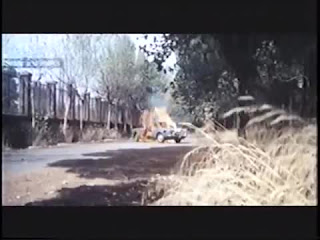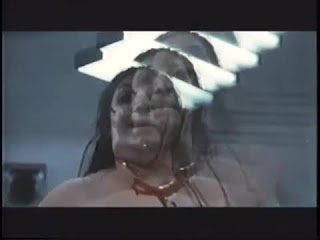Find more giallo
reviews here.
Otherwise known as “The Magician” or “Macchie Solari” (“Sunspots”),
this is a review of the uncut version of the film which clocks in at 100
minutes, as opposed to the 85 minute cut.
“People have been knocking themselves off like flies.”
Thrust into the boiling hot, blinding white light of the sun – as solar flares
erupt and moans of sexual ecstasy call out – Armando Crispino's giallo gets off
to a fast-paced and violent start. A rash of suicides plague the beautiful city
of Rome as it bakes in the August sun – a woman slits her wrists, a man wraps a
bag over his head before diving into a river, another blows himself up in his
petrol-drenched car, and a father shoots himself to death after slaughtering
his own children.
“It seems sweet to die in August.” There is a
blood-soaked madness spreading through the populace, and the morgue is
jam-packed with mutilated cadavers – but is every single one of these apparent
suicides what they appear to be? Might this be the ideal time for a killer to
strike and hide their devious deeds under the guise of suicide?
Click “READ MORE” below to continue the review and see
more screenshots...
“You can't play around with corpses, it's not funny.”
Simona Sana (Mimsy Farmer, Four Flies On Grey Velvet) is a
pathologist intern who is writing her thesis on 'authentic versus simulated
suicides'; a tightly-wound and sexually frustrated woman who is struggling
to keep her mind focused in spite of the steamy temperature consuming the
city. However, surrounded by the cold bodies of the dead, this icy lady can't
help but see bizarre and warped visions of the cadavers reanimating to cop a
quick feel and get raunchy with one another. To Simona, the delirious line between
sex and death is wafer-thin, and such is the sexual politics of the 1970s, her
low-cut tops and split skirts provide enough of an excuse for any number of
sex-mad men to leer – including the caretaker at her apartment complex (Leonardo
Severini). The film wobbles across a fine line when it comes to sex: is it
unchecked sexual desire, or the intrusive glare of the sun that's driving the
men wild, and what part do the filmmakers have in all this?
“You get your kicks from this stuff?” Surrounded by
death – presented in clinical, everyday detail by Crispino and DP Carlo Carlini
– and under intense academic pressure, it's easy to see why Simona is stressed.
The perverted advances of her colleague Ivo (Ernesto Colli, Torso)
– who will gladly fondle pretty, dead flesh in front of her – only adds to her
frenzied inner turmoil and sexual dysfunction.
“You know your corpses, but I know my souls.” Things
begin to spiral out of control when a young woman is found dead on a beach – a
grisly, self-inflicted gunshot wound to the head the apparent cause of death –
and her Priest brother comes to identify the body. Father Paul Lenox (Barry
Primus) is adamant that she was murdered – and he suspects the man she was
set to marry: Simona's distant, womanising father Lello (Carlo Cataneo).
Paul is no ordinary, respectable man of the cloth though, he is a mentally
unstable former race car driver who is prone to violent outbursts, and his
all-encompassing rage and quest for justice gradually devours Simona.
“You know it takes more patience to photograph stones
than corpses?” Torn in two ways by her sexual desires, Simona begins to
unravel. Paul's search to uncover the conspiracy surrounding his sister's
murder clashes with Simona's increasing aversion to the sun, and continued visions
of perversion, not that her photographer boyfriend Edgar (Ray Lovelock, Oasis of Fear) seems to mind. He's keen to unleash the sexual side of Simona,
or 'my little ice cube' as he likes to call her, but will being the
witness to violence turn her on, and is somebody really covering up their
murder spree with faked suicides?
“You don't want the truth, you want revenge and someone
to hate!” Clashing clinical, distanced medical science with impure and
guilt-ridden religion, Lucio Battistrada and Armando Crispino's script gets off
to a feverishly-paced start, but ultimately promises something that the second
half can't quite delivery in-full. Fans of gory giallo flicks should be
well-served by the ghastly sights – particularly in the opening scenes – and
the skin quotient will tease the lascivious corners of the viewer's mind, but
as the complex story progresses, satisfying thrills give way to convoluted
confusion and a slackening pace. Side characters such as Antonio Casale's
Inspector Silvestri have little to do, while others like Angela Goodwin's
boozed-up grot-artist Daniela mostly muddy the waters, in spite of their
potential.
“Art is definitely inferior to reality, especially in
horror and sadism.” The biggest problem with the film is that it fails to
carry Simona through to the conclusion – come the third act, the main character
with the compelling story and inner torment is left swinging in the wind as a
passive observer – her hands are completely off the wheel during the climax.
It's a strange direction for the film to take, particularly as Simona is shown
to be as much of a fighter as she is a victim – she certainly gives Ivo a
telling off – but after that it seems to become Paul's story. Then, a flood in
Florence, a rescued Bible, some dodgy business practices, and more are all
rushed into play, but inspire more questions than answers.
“Another celebrated victim of the summer sun.” Flaws
aside though, and Autopsy generally delivers the goods – or most of
them. It's brash, it's grisly, and yet it can also be beautiful – there's
plenty of touristy shots of Rome, and Daniele Alabiso's occasionally jagged
editing helps pull the viewer inside the minds of the protagonists as they seek
to unravel the tricky plot. Director Crispino is most successful in bringing a
sense of psychological mania to the presentation, sights that are effectively
skewered by the sounds of Ennio Morricone's frenzied, sexualised score.
“You may have a knowledge of souls but that doesn't
qualify you to dispute scientific fact.” While never managing to reach the
levels of intrigue, style, or vicarious thrills that an Argento or Martino
giallo will reliably deliver, Autopsy is nonetheless a workable murder
mystery that covers enough of the bases to prove to be one of the more interesting
entries in the giallo genre, even if it fails to execute every single one of the
promises it makes up-front.

+001.jpg)











%20001.jpg)





No comments:
Post a Comment